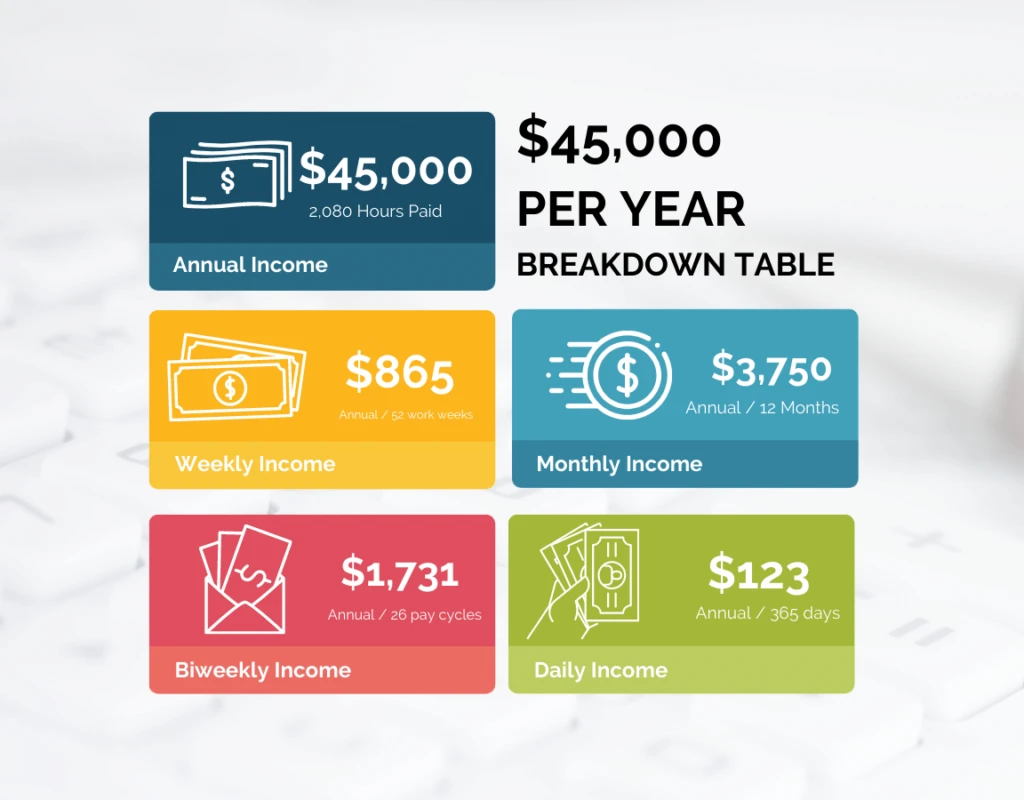Knowing your annual salary doesn’t tell you a lot. What you really want to know is how much you make per hour.
In other words, is the job worth your time for $21.63 per hour? It puts things into perspective and helps you decide what you want to do with your life.
So $45,000 a year is how much an hour? We show you below.
Use our salary to hourly calculator to see your exact pay broken down!
Table of Contents
$45000 a Year is How Much an Hour? Monthly Breakdown After Income Taxes
If you find yourself wondering $45,000 a year is how much a month after taxes, consider this. Your after-tax income is what you bring home, aka the money you have to pay your bills and have fun. This is the most accurate picture of what you earn, but it’s nice knowing the gross amount an employer pays.
Here’s what $45,000 a year looks like after taxes on a monthly basis.
While each state has a different tax rate, we can cover the federal taxes you’d owe. Assuming you’re paid once a month, you’d make $3,750 per month BEFORE taxes. From that amount, you’d pay federal income taxes, Social Security tax, and Medicare tax.
In our example, we’ll assume you don’t have any dependents. You’d pay around $405 in federal income tax, $233 in Social Security tax, and $54 in Medicare tax. Those numbers would change if you had dependents or you had any pre-tax deductions such as health insurance or 401K contributions.
$45000 a Year Is How Much Biweekly?
If your employer pays you biweekly, you receive 26 paychecks per year. How much you receive depends on a few things. Obviously, your tax rate pays a role, but also the benefits your employer offers. Do you get paid vacation time or is it unpaid?
Your bi-weekly paychecks would be $1,731 before taxes and any other common deductions (pre-tax contributions). Bi-weekly paychecks occur every two weeks. Some months you may get two paychecks and some months you’d get three paychecks.
The same would be true if your employer paid you twice a month on the same days of the month, such as the 15th and the 30th of each month.
$45000 a Year Is How Much a Week?
There are 52 weeks per year. If your employer pays you weekly, you’d receive 52 paychecks per year. Before taxes and any other deductions/contributions, your paycheck would be $865 per week. You’d receive four or five paychecks a month, depending on the month as some months have five weeks in them.
$45000 a Year Is How Much a Day?
Sometimes it’s nice to know how much you get paid per day. $45,000 per year is such an ambiguous number. It doesn’t tell you exactly how much your day is worth. On those tough days when your days drag, it may help to know how much you make per day.
In order to calculate this, you must know how many days you work a year. If you work a standard weekday 9 to 5 job, there are 260 working days in 2023. This includes time off for federal holidays. That means you make around $173 per day.
If you work fewer days, but more hours per day or you work more than five days per week, your amount would differ, but the average person makes $173 per day.
How Much Is $45000 a Year per Hour?
If you find yourself wondering how much is $45,000 a year per hour, check this out.
Knowing how much you make per hour even if you get paid a salary is important. When you’re looking for a job, it helps to weigh the pros and cons of the job, including the opportunity cost of taking it based on its hourly rate.
If you work a standard 9 to 5 job on the 260 working days in 2023, you’d make $21.63 per hour. This is the same whether you get paid vacation or not – if you don’t get paid vacation, and you work the two weeks, you’d get paid. If you do get paid vacation, you get paid not to work.
Check Out This Related Article About Earning $22 an Hour
Now if the company pays you benefits, you may want to consider the financial benefit of them. For example, health insurance is a costly benefit. If your employer covers your insurance 100%, that’s a benefit to add to your hourly rate. The same is true if they offer a 401K match or any other financial benefits.
Even if you don’t receive the pay in hand – you get benefits in lieu of the money, which could help you decide if the job is the right choice.
$45000 per Year Breakdown Table
Here’s a quick breakdown of what 45k a year looks like for the average person.

Tools for Living on 45k a Year
Get Paid to shop! Rakuten is a free and easy way to earn cash back and receive special bonus offers from over 3,500+ stores. All you need to do is join, shop, and get paid.
- Easy Registration
- Free to use
- Most major retailers partner with Rakuten
- Welcome bonus offers
- Only US and Canadian residents can join
- Low earning potential
Allow Credit Saints to work with all three credit bureaus to remove negative, inaccurate items from your credit history. When they are done, they will analyze and optimize your report to secure a bright financial future.
- 90-Day Money Back Guarantee
- A+ BBB Rating
- Excellent Service With 24/7 Availability
- Open 7-Days a Week
- Same Team From Start to Finish
- 3 Monthly Subscription Packages
- Initial Work Fee
- Monthly Subscriptions Fees
- Not Available in 9 States - Georgia, Kansas, Louisiana, Ohio, Oregon, Minnesota, Mississippi, Missouri, and South Carolina
Free app that pays you to shop online, watch videos, take surveys, search the web & playing games online. Payouts are redeemable via gift card or cash!
- Free to join!
- $10 Sign Up Bonus
- Variety of rewards options
- In-store & online cash back rewards
- Very easy to use website & mobile app
- Some offers require a lot of effort to earn rewards
- Some tasks don't offer many points
- Payouts for watching videos can be low
How to Make 45k a Year
If you find yourself looking for jobs that pay 45k a year, and you don’t have a college degree, look at jobs like:
- Retail Store Manager – Retail store managers have demanding jobs and earn every dollar of their $45,000 annual salary. Retail managers don’t need a college degree, but plenty of experience in retail will help them get there faster. Some retail store managers also earn commission based on how their store did each month.
- Electrician – Electricians must go to trade school but can make $45,000 a year shortly after starting their apprenticeship. It’s a long road to becoming a full-fledged electrician, but they earn top pay right out of school, making it worthwhile.
- X-Ray Tech – X-ray techs must go to school, but usually just for an associate’s degree or certificate in x-ray tech. This rewarding job lets you work in the medical field without putting yourself into debt with medical school expenses.
- Truck Driver – Truck drivers earn at least $45,000 annually, especially if they drive over the road. So you might spend a few days away from home, but you get several days at home without working too, so it can be a good tradeoff for someone who likes to get their hours worked in at once.
- Dental Technician – Dental technicians do all the work for the dentist but don’t have the hefty dental school debt dentists have. In addition, dental technicians often get paid hourly, so if you work overtime, you’ll make even more than $45,000 an hour, and it can be a rewarding job helping people love their smile again.
- Survey Researcher – A survey researcher helps companies make the most of their products and services. You may need a marketing degree or an associate’s degree in marketing to find a survey researcher position for $45,000 a year, but that’s only two years of your life to earn a decent income.
Of course, the list is endless, and now that you know the average hourly salary to make $45,000 a year, you can determine which jobs will get you where you want to be.
Today, it’s easier than ever to make $45,000 a year or more if you start a side gig or two. Depending on how busy you want to be, you can add jobs like Uber or Lyft driver, freelance writer, Instacart shopper, or website designer to your repertoire.
If you want something more passive, you can answer surveys on Swagbucks, use cashback sites like Rakuten, or even invest your money. Dividend stocks, ETFs, and even online high-yield savings accounts pay you a little money and every dollar adds up!
Paid Time Off Vs. No Paid Time Off
Some jobs offer paid time off, and others don’t. Usually, when you’re paid a salary, it’s a full time job and includes two weeks of paid time off, but not always. If you get paid time off, your per-hour rate increases because you work 2,000 hours a year versus 2,080 hours. Instead of $21.63 per hour, you’d make $22.50 an hour. However, if you don’t get paid time off, you work 2,080 hours a year, and your per-hour rate remains $21.63 per hour.
Additional Ways to Boost Your Annual Salary
If $21.63 – $22.50 an hour isn’t enough to make your personal finance life feel secure or for you to live how you want, here are some ways to boost your annual salary.
Negotiate a Raise
The easiest way to boost your annual salary is to ask for a raise. We know this isn’t the easiest thing to do, but it allows you to stay at your job and make more money. To increase your chances of getting the raise, consider these tips:
- Research how much other people in the area in similar roles make
- Make a list of your accomplishments
- Make a list of reasons you feel you deserve the raise
- Make a list of things you’ll do for the company if you get the raise

New Job
If your employer isn’t on the same page or can’t afford to give you a raise, consider finding a new full time job, especially if you find out other companies in the area make much more. Before you take a new job, consider the following factors:
- Look at the pay and make sure it’s more per hour than what you currently make
- Evaluate the benefits, such as health insurance, bonuses, or employee stock options
- Consider the hours, responsibilities, and the commute
Don’t assume that it’s worth it because a job pays a few more dollars an hour. Instead, look at the big picture and make sure the move makes sense.
New Career
If you find the income you make is the most you’ll make at your job, no matter where you work, you may want to consider a new career. This comes with more work, though. You likely can’t just change careers and instantly get a raise. Most new careers require some training, or you may have to return to school. Do your research and determine what it will take to start a new career, and ensure that the salaries are higher than what you currently make.
Side Hustles
If you like your job or can’t find another career that pays more, consider starting a side hustle. Doing what you want in your free time can help you make more money. Some common side hustles include:
- Driving for Uber or Lyft
- Delivering food for
DoorDash or Uber Eats - Starting a freelance gig as a content writer, web designer, or proofreader
- Starting a side gig in your area pet sitting, walking dogs, house sitting, or mowing lawns
Passive Income
Another great way to increase your income is to earn passive income. There are many ways you can earn passive income, starting with investing. Invest money in a high-yield savings account or CD if you want something conservative. But if you’re willing to take some risk, consider investing in stocks, ETFs, or mutual funds and earn passive income.
If you would rather do some work upfront and then earn residual income on your efforts, consider the following:
- Create and sell an online course
- Write an eBook
- Take stock photos and sell them online
Example Budget for $45000 a Year
When you make $45,000 a year, you have to be a little creative with your budget if you
don’t have other income from a partner or side hustle.
To keep yourself on the right path, consider this budget:
- 50% of your take-home pay for fixed expenses, including housing, utilities, basic food, and clothing
- 20% of your take-home pay for fun spending
- 20% of your take-home pay for saving
- 10% of your net income for charitable giving

$45000 a Year is How Much an Hour: FAQ
Can I Live Off $45000 a Year?
You can live off $45,000 a year if you’re frugal, but sharing your responsibilities with a partner or friend is best. If you live alone, you’ll need a modest place to live (usually rent) and to keep your everyday expenses low. If you need to supplement your income, consider a side gig that can help you make more.
Can You Make $45000 a Year Without a Degree?
There are plenty of jobs that you can do to make $45,000 without a degree. Retail and restaurant store managers are just a couple of examples. You could even start your own business and make at least $45,000 a year. If you can’t make that much working your full-time job, you can add a side gig to your repertoire.
What’s the Total Number of Working Days in 2023?
There are 260 working days next year if you work five days a week.
How Do You Calculate Hourly Rate From Annual Salary?
To calculate your hourly rate from an annual salary of $45,000, divide the salary by 52 weeks in the year. This gives you your weekly salary. Next, you want to determine the hourly wage, which requires you to divide the weekly salary by 40 hours, and you get your hourly wage from your annual salary.

Is $45000 a Year a Good Salary?
If you wonder is $45,000 a year is a good salary, consider this. The minimum wage in the United States is $7.25 an hour. If you make $45,000 a year, you make $21.63 per hour – you make almost 3 times the minimum wage.
Now let’s look at the average weekly salary. The Bureau of Labor Statistics states that the average American makes $865 a week working full-time. That comes out to $44,980 per year. If you’re making $45,000 you are above the average American. Depending on your financial goals, you may or may not consider adding additional streams of income.
Samantha Hawrylack is a personal finance expert and full-time entrepreneur with a passion for writing and SEO. She holds a Bachelor’s in Finance and Master’s in Business Administration and previously worked for Vanguard, where she held Series 7 and 63 licenses. Her work has been featured in publications like Grow, MSN, CNBC, Ladders, Rocket Mortgage, Quicken Loans, Clever Girl Finance, Credit Donkey, Crediful, Investing Answers, Well Kept Wallet, AllCards, Mama and Money, and Concreit, among others. She writes in personal finance, real estate, credit, entrepreneurship, credit card, student loan, mortgage, personal loan, insurance, debt management, business, productivity, and career niches.




